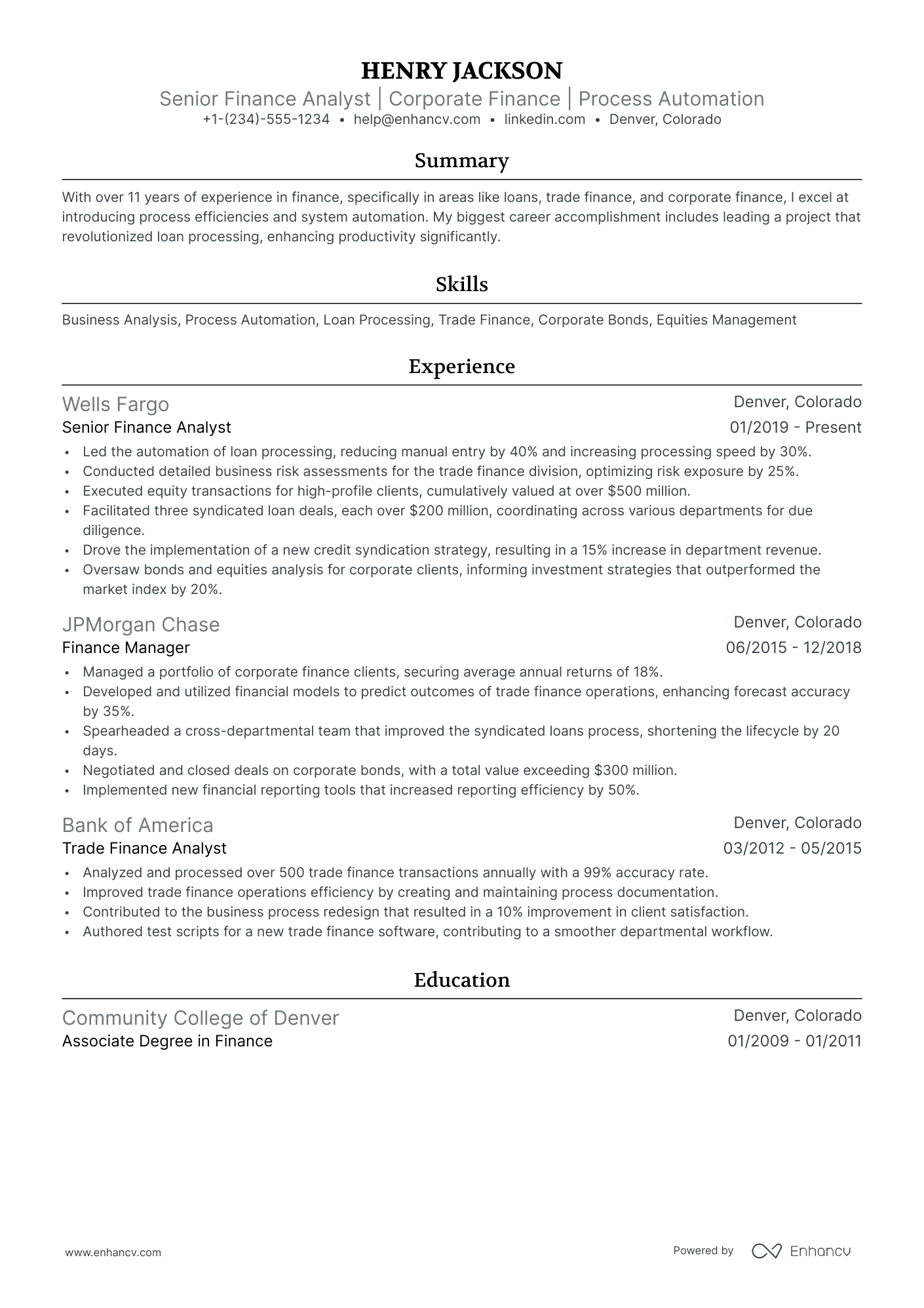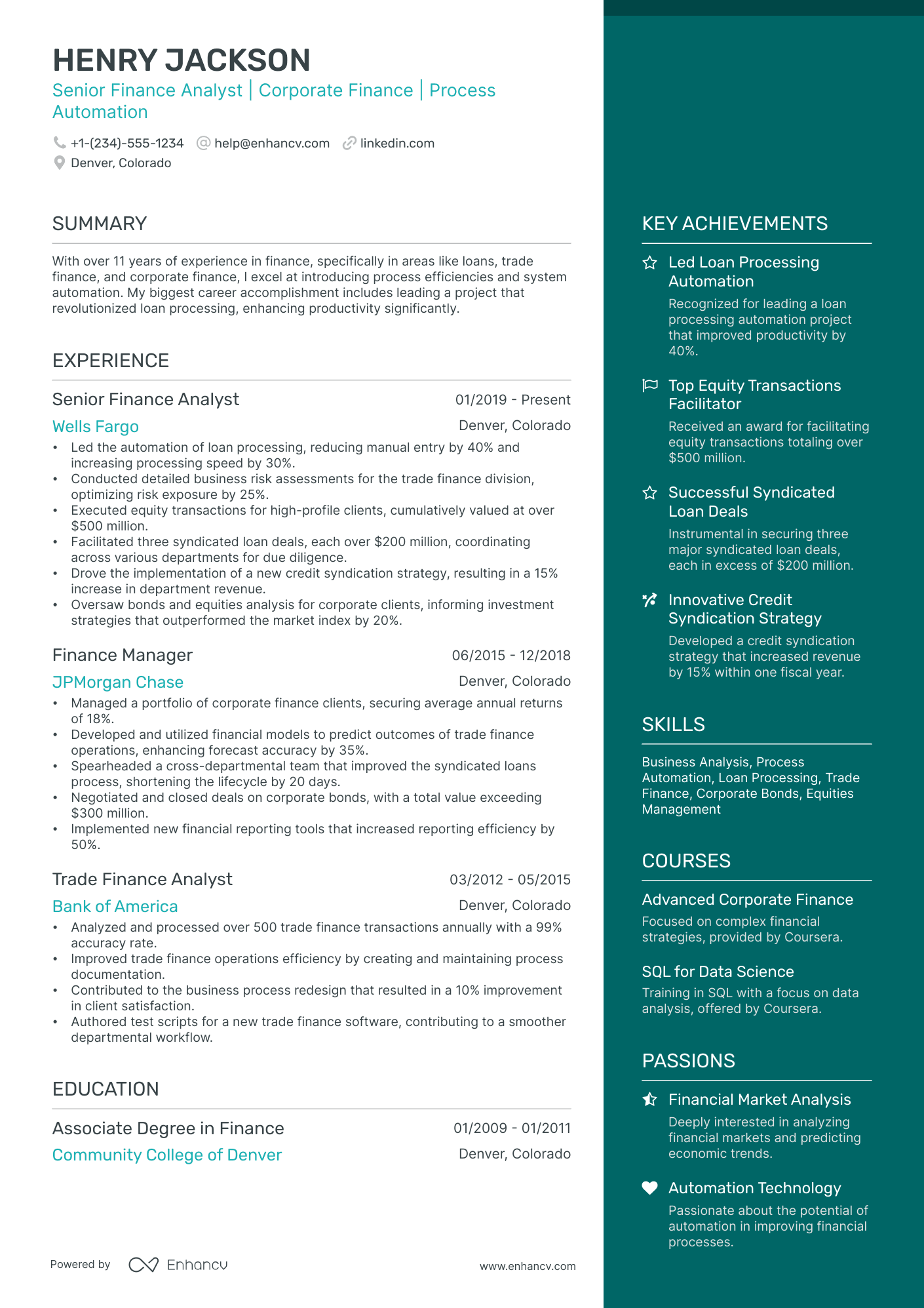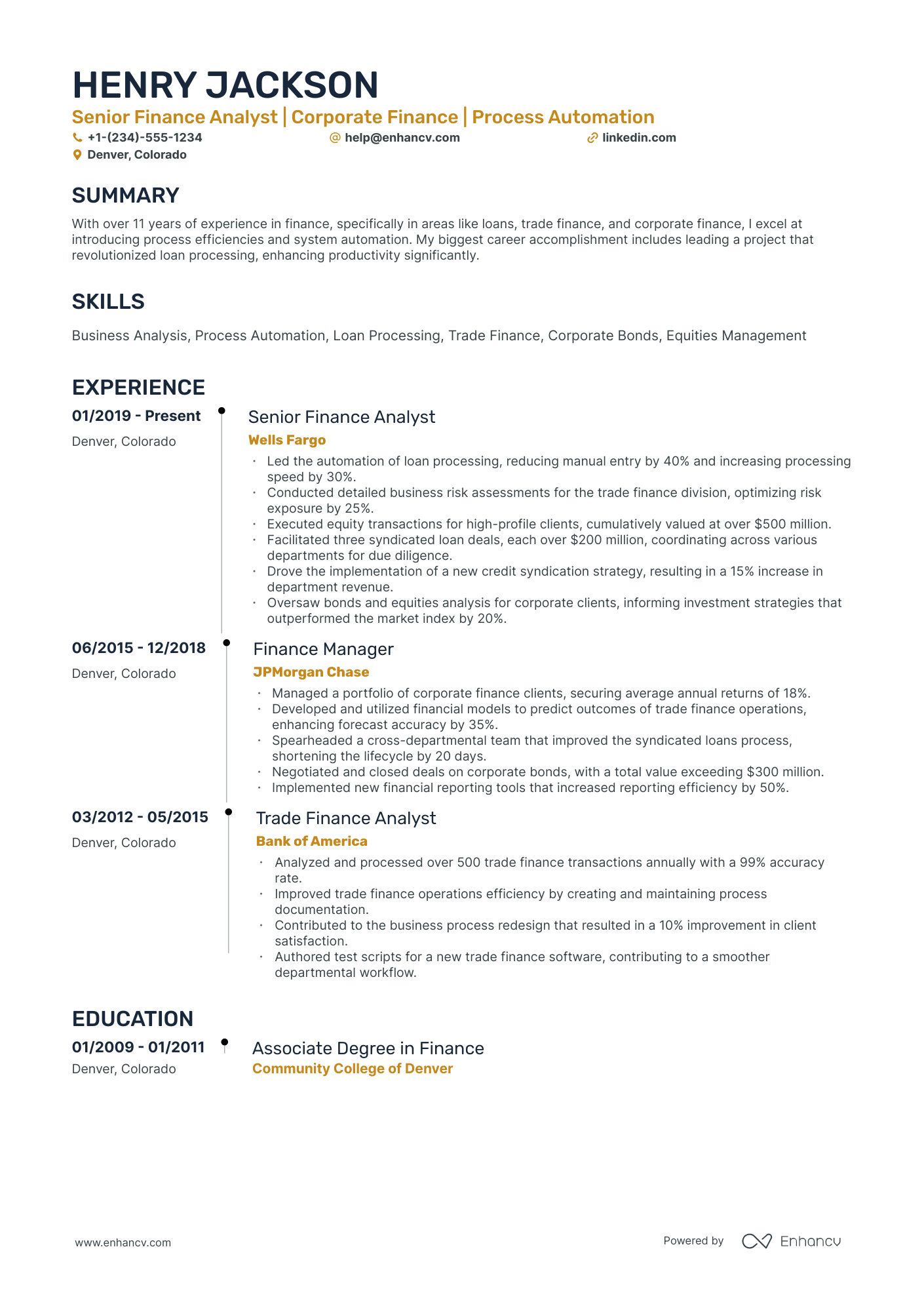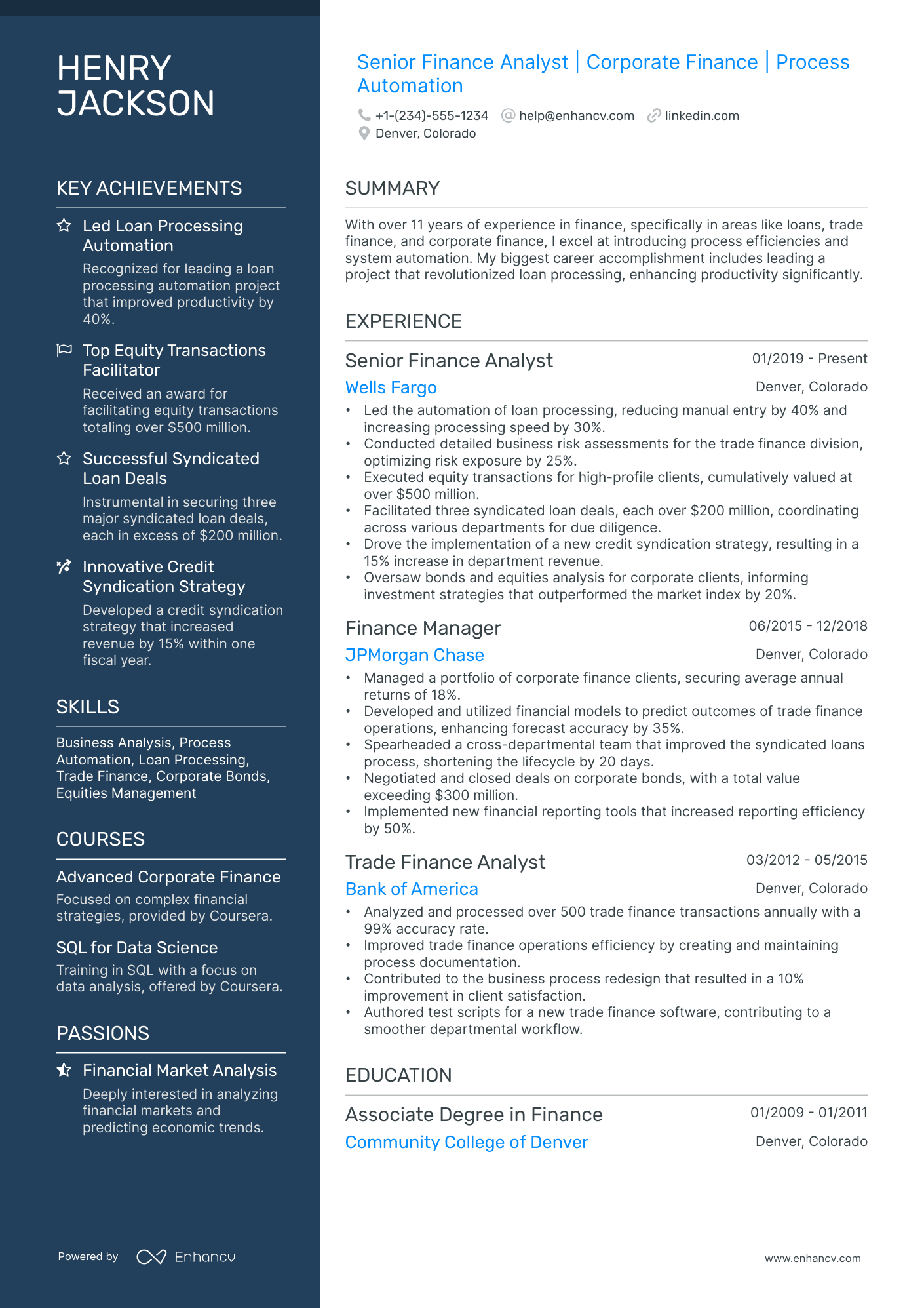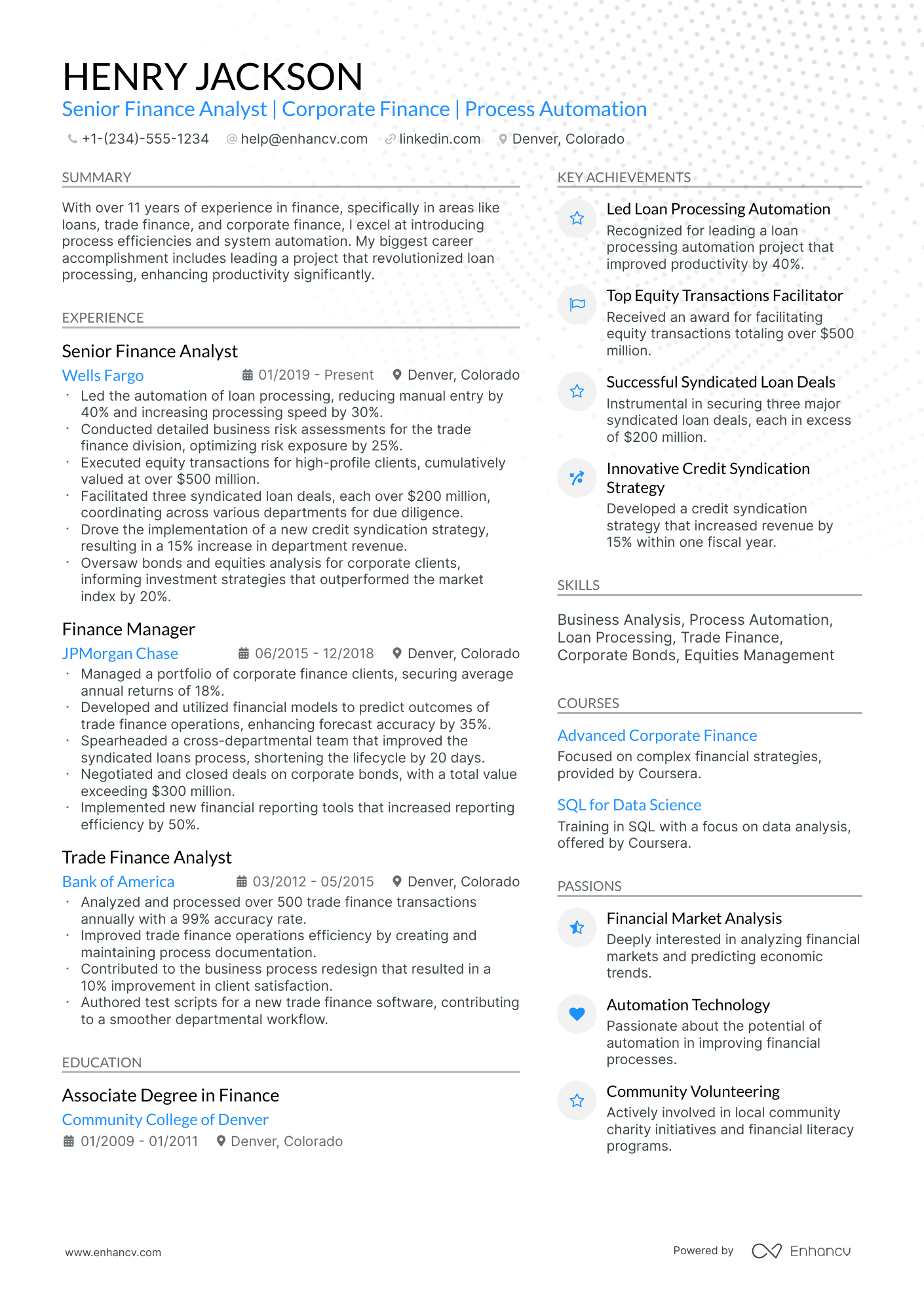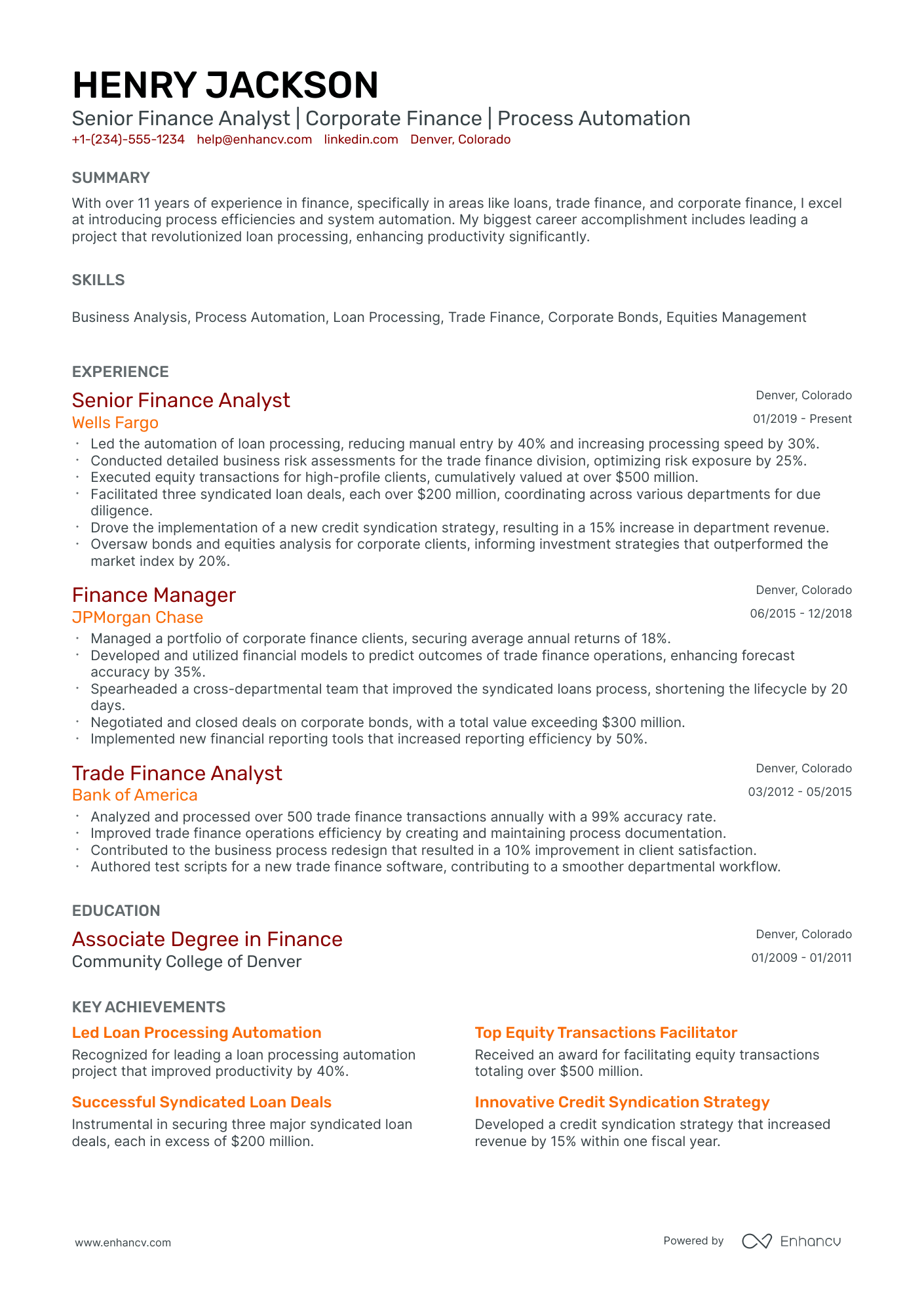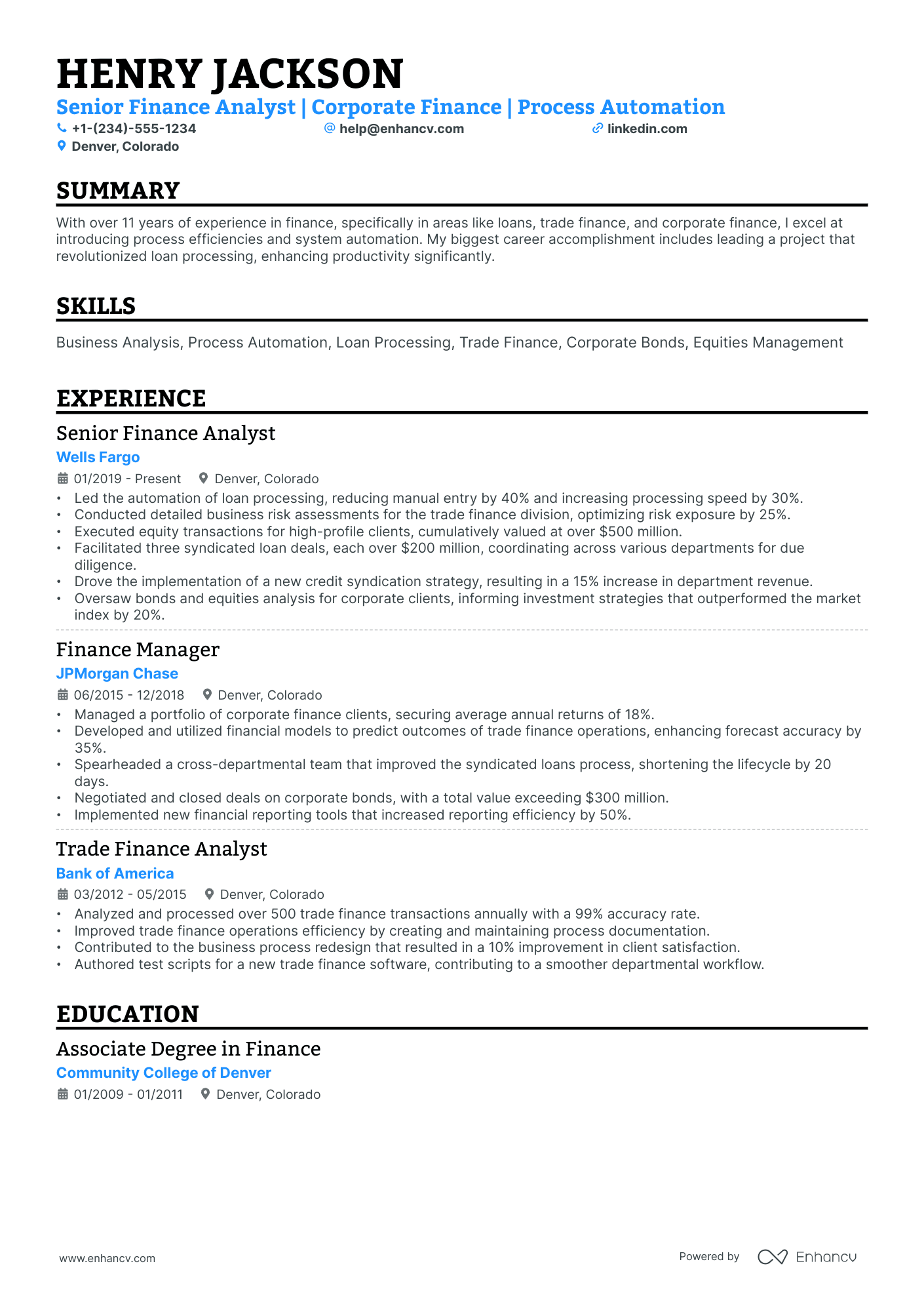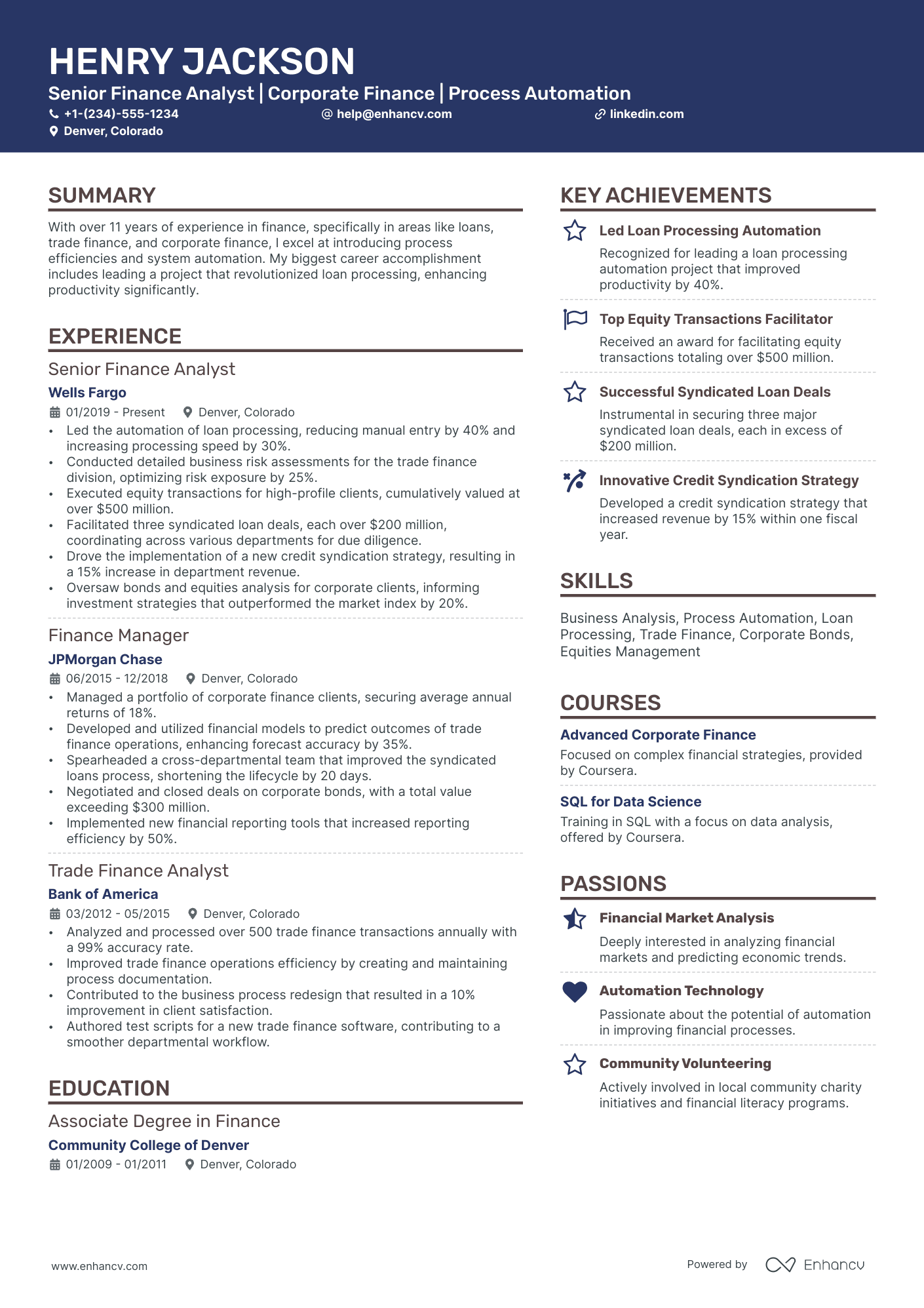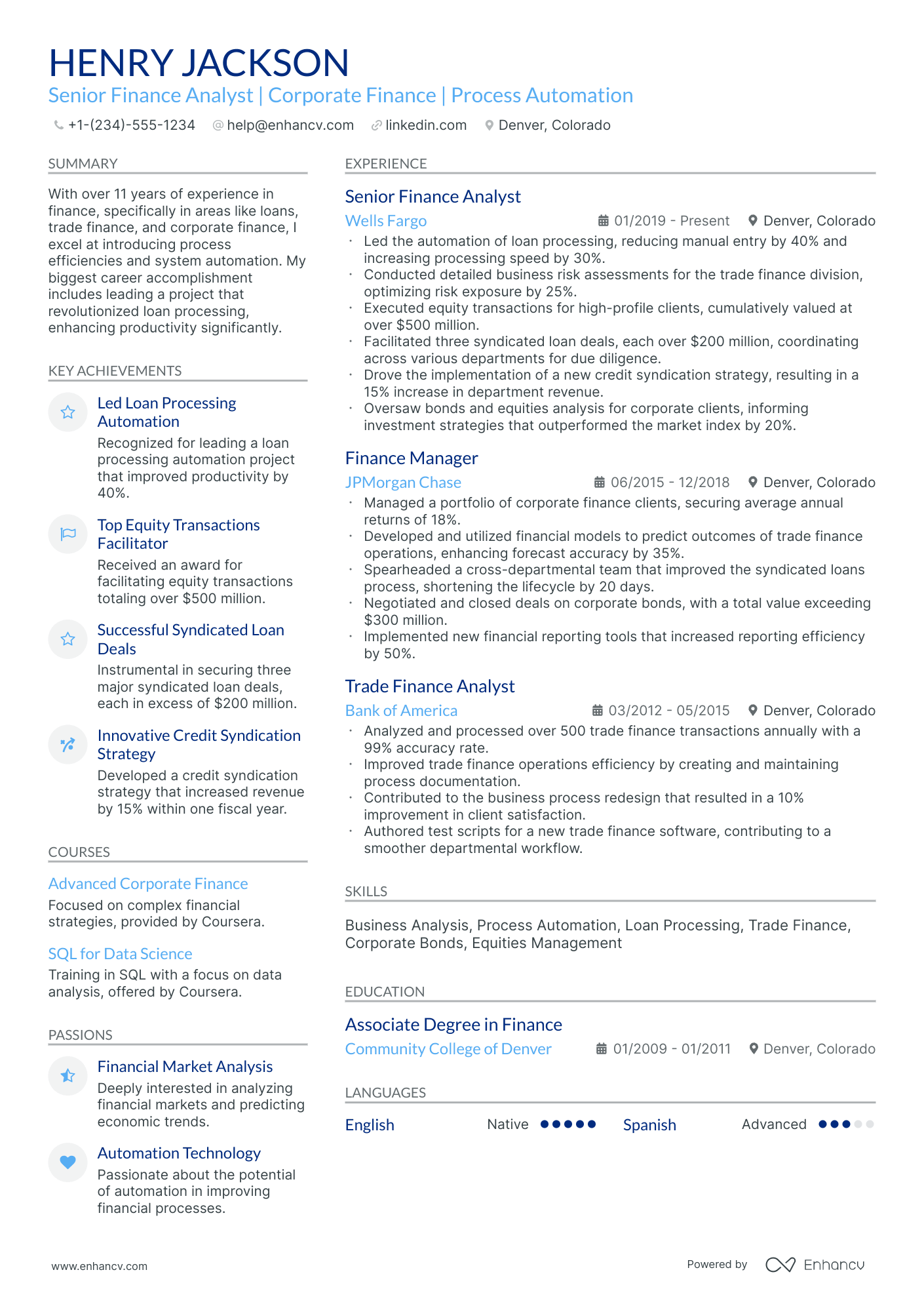As a banking business analyst, one specific resume challenge you might face is effectively showcasing your financial modeling and risk management skills amongst a sea of other qualified professionals. Our guide provides you with targeted tips to differentiate your skill set on your resume, ensuring your expertise in financial analysis shines through to potential employers.
- Banking business analyst resumes that are tailored to the role are more likely to catch recruiters' attention.
- Most sought-out banking business analyst skills that should make your resume.
- Styling the layout of your professional resume: take a page from banking business analyst resume examples.
How to write about your banking business analyst achievements in various resume sections (e.g. summary, experience, and education).
Is there a correct way to format your banking business analyst resume?
This is a tricky question. While skimming over your resume, recruiters will be looking at your experience and the message your profile conveys. That's why your resume format needs to be clear and concise, serving to supplement and organize your experience. Professional best practices point that the best banking business analyst resumes:
- Follow the reverse chronological order, where the most recent experience items are presented first . This is to keep your expertise succinct and to show recruiters your career growth over the years;
- Have a clearly defined header that includes all relevant contact information and a portfolio or a LinkedIn link. In some countries, it is acceptable to include a professional photo , so that your application is more memorable;
- Feature the most important banking business analyst resume sections towards the top, e.g. summary, skills, and experience. That way, recruiters can immediately find information that is relevant to the role;
- Take up no more than two pages - and two pages are the exception for more experienced professionals. Keep your expertise to the point and use your banking business analyst resume real estate wisely .
- Selecting modern, yet simple fonts, e.g. Rubik, Lato, etc., would help your application stand out;
- Many candidates stick with the tried-and-tested Arial or Times New Roman, but you'd want your banking business analyst resume to be a bit more unique;
- The ATS can read all serif and sans-serif fonts, so you should avoid fancy, formal script (or cursive) fonts.
Consider your target market – resumes in Canada, for example, follow different layout conventions.
Upload & Check Your Resume
Drop your resume here or choose a file. PDF & DOCX only. Max 2MB file size.
PRO TIP
If you failed to obtain one of the certificates, as listed in the requirements, but decide to include it on your resume, make sure to include a note somewhere that you have the "relevant training, but are planning to re-take the exams". Support this statement with the actual date you're planning to be re-examined. Always be honest on your resume.
The key to your banking business analyst job-winning resume - present your expertise with these sections:
- A header to make your resume more scannable
- Snapshot of who you are as a professional with your resume soft skills, achievements, and summary or objective
- Job advert keywords in the skills section of your resume
- Resume experience quantifying your past job successes with metrics
- A relevant education, certification, and technical sills section to provide background to your technological/software capabilities
What recruiters want to see on your resume:
- Demonstrated knowledge of banking regulations and compliance standards (e.g., Dodd-Frank, Basel III, Anti-Money Laundering, etc.)
- Experience with banking software and analytical tools (e.g., SAS, SQL, Tableau, or equivalent systems)
- Proficiency in financial modeling, risk assessment, and profitability analysis specific to banking products and services
- Understanding of business process re-engineering and improvement within a banking context
- Track record of successful project management and delivery in the banking sector, with an emphasis on digital transformation or IT projects
What to include in the experience section of your banking business analyst resume
The resume experience section is perhaps the most important element in your application as it needs to showcase how your current profile matches the job.
While it may take some time to perfect your banking business analyst experience section, here are five tips to keep in mind when writing yours:
- Assess the advert to make a list of key requirements and look back on how each of your past jobs answers those;
- Don't just showcase you know a particular skill, instead, you need proof in the form of tangible results (e.g. numbers, percent, etc.);
- It's perfectly fine to leave off experience items that don't bring anything extra to your skill set or application;
- Recruiters want to understand what the particular value is of working with you, so instead of solely featuring technologies, think about including at least one bullet that's focused on your soft skills;
- Take care with wording each bullet to demonstrate what you've achieved, using a particular skill, and an action verb.
The below banking business analyst resume examples can help guide you to curate your professional experience, following industry-leading tips and advice.
- Led a team to redesign and implement new loan origination software for Wells Fargo, improving processing time by 25% and customer satisfaction by 15%.
- Conducted a detailed cost-benefit analysis for new fintech partnerships, which contributed to a 10% growth in the bank's small business lending portfolio.
- Authored comprehensive monthly and quarterly analytics reports on market trends and operational performance, directly influencing strategic planning and resource allocation.
- Managed a portfolio of projects at Bank of America aimed at digital transformation, resulting in an increase in mobile app transactions by 40%.
- Spearheaded the business requirements gathering phase for the successful rollout of a customer relationship management (CRM) system, linking over 10,000 employee users to a central database.
- Facilitated stakeholder meetings and workshops to drive consensus on project priorities and timelines, which reduced project delays by an average of 20%.
- Designed and executed A/B testing protocols for Citibank's online banking platforms, leading to an optimized user experience that increased daily logins by 35%.
- Advised on regulatory compliance improvements for new banking products, successfully navigating audits without any major findings for three consecutive cycles.
- Initiated a data reconciliation project to ensure accuracy in reporting, eliminating a backlog of discrepancies and improving report reliability by 100%.
- Collaborated with cross-functional teams at JP Morgan Chase to define user stories and acceptance criteria for new online account management features, which boosted customer retention by 5% within the first year.
- Clarified and negotiated business priorities with product owners, ensuring alignment with the core banking strategy and technology capabilities.
- Contributed to risk analysis processes, identifying potential financial and operational risks associated with the bank's consumer lending practices and recommending mitigation strategies.
- Played a crucial role in the migration of Goldman Sachs' legacy systems to a modern core banking platform, which led to an operational cost reduction of 15% through streamlining processes.
- Developed and led training sessions for over 200 bank employees on the use of new financial analysis tools and methodologies to improve the efficiency of the financial reporting process.
- Implemented a series of financial model enhancements for better forecasting accuracy, which aided senior management in strategic investments and decision-making.
- Implemented complex statistical models to analyze and forecast PNC Bank's loan loss reserves, which helped maintain capital adequacy ratios above regulatory thresholds.
- Coordinated with IT and data science teams to integrate new analytical tools into the existing banking systems, streamlining data flow and reporting efficiency.
- Crafted and presented reports on predictive analytics findings to senior leadership, influencing the bank's approach to credit risk management.
- Drove the integration of a new transaction monitoring system for HSBC, which enhanced fraud detection by 30% and contributed to protecting customer assets.
- Worked closely with development teams using Agile methodologies to deliver banking system improvements ahead of schedule, leading to a 20% increase in project delivery speed.
- Analyzed user feedback to prioritize system enhancements, which resulted in consistently high user satisfaction scores for the bank's IT services.
- Contributed to the success of a strategic business analysis project for Santander that identified redundancy in processes, saving $200,000 annually.
- Assisted senior analysts in the development of new risk assessment frameworks, which decreased loan defaults by 3% in the following fiscal year.
- Supported the collection and documentation of business requirements for banking system updates, ensuring all regulatory and compliance needs were met efficiently.
Quantifying impact on your resume
- Analyze large datasets to identify trends, predict customer behaviors, and increase the efficiency of banking operations.
- Develop financial models to forecast banking performance, guide strategic decision-making, and evaluate potential investments.
- Monitor and report on key performance indicators (KPIs) for various banking products, highlighting areas for improvement and growth opportunities.
- Validate and improve the accuracy of risk assessment models, reducing the margin of error in credit scoring and other predictive analyses.
- Assist in the automation of reporting processes to enhance data accuracy and reduce the time spent on generating reports by a significant percentage.
- Identify cost-saving opportunities through process optimization, leading to a measurable reduction in operational expenses.
- Collaborate with cross-functional teams to implement data-driven solutions that enhance customer experience and satisfaction.
- Contribute to regulatory compliance efforts by interpreting new regulations and ensuring all analytical procedures adhere to industry standards.
Action verbs for your banking business analyst resume
What if my banking business analyst experience doesn't match the requirements?
You've just graduated from college and may have no real world job experience . What should you include within your resume then?
Instead of making up information or adding irrelevant past jobs (e.g. your on-campus work during freshman year), you can:
- Shift the focus from your professional experience to your community impact with your volunteer work. This would showcase numerous soft skills you've built over time (e.g. interpersonal communication);
- Highlight the projects you've completed, as part of your coursework, or, on your own. Thus, you will align your technical background with recruiters' requirements;
- Consider spotlighting your transferrable skills. Or, what lessons and talents your current professional and personal experience has taught you and how they could benefit your potential employers;
- Even if you've had a few months of internship experience, that is relevant for the role, make sure to include this. Recruiters do care about the years of experience you happen to have, but, at the end of the day, your profile would also be assessed based on role alignment.
Recommended reads:
PRO TIP
If the certificate you've obtained is especially vital for the industry or company, include it as part of your name within the resume headline.
Popular banking business analyst hard skills and soft skills for your resume
Apart from assessing your professional expertise, recruiters are on the lookout for whether your skills align with the job.
Your profile would thus be assessed in regard to your:
- Hard or technical skills - your ability to perform on the job using particular technologies or software
- Soft skills - how you adapt, communicate, and thrive in different environments.
Both types of skills - hard and soft skills - are important for your resume, so make sure to create a dedicated skills section that:
- Lists up to five or six skills that align with the job advert.
- Integrates vital keywords for the industry, but also reflects on your personal strengths.
- Builds up further your skills with an achievements section within which you explain what you've achieved thanks to using the particular skill.
- Aims to always quantify in some way how you've used the skill, as it's not enough to just list it.
What are the most sought out hard and soft skills for banking business analyst roles?
Check out the industry's top choices with our two dedicated lists below:
Top skills for your banking business analyst resume:
SQL
Excel
Tableau
SAS
Python
R
Business Intelligence (BI) tools
Data Modeling
Financial Analysis Software
CRM Systems
Analytical Thinking
Problem Solving
Communication
Attention to Detail
Team Collaboration
Adaptability
Time Management
Critical Thinking
Stakeholder Management
Negotiation
PRO TIP
If you happen to have some basic certificates, don't invest too much of your banking business analyst resume real estate in them. Instead, list them within the skills section or as part of your relevant experience. This way you'd ensure you meet all job requirements while dedicating your certificates to only the most in-demand certification across the industry.
Education section and most popular banking business analyst certifications for your resume
Your resume education section is crucial. It can indicate a range of skills and experiences pertinent to the position.
- Mention only post-secondary qualifications, noting the institution and duration.
- If you're still studying, highlight your anticipated graduation date.
- Omit qualifications not pertinent to the role or sector.
- If it provides a chance to emphasize your accomplishments, describe your educational background, especially in a research-intensive setting.
Recruiters value banking business analyst candidates who have invested their personal time into their professional growth. That's why you should include both your relevant education and certification . Not only will this help you stand out amongst candidates, but showcase your dedication to the field. On your banking business analyst resume, ensure you've:
- Curated degrees and certificates that are relevant to the role
- Shown the institution you've obtained them from - for credibility
- Include the start and end dates (or if your education/certification is pending) to potentially fill in your experience gaps
- If applicable, include a couple of job advert keywords (skills or technologies) as part of the certification or degree description
If you decide to list miscellaneous certificates (that are irrelevant to the role), do so closer to the bottom of your resume. In that way, they'd come across as part of your personal interests, instead of experience. The team at Enhancv has created for you a list of the most popular banking business analyst certificates - to help you update your resume quicker:
The top 5 certifications for your banking business analyst resume:
- Chartered Financial Analyst (CFA) - CFA Institute
- Certified Business Analysis Professional (CBAP) - International Institute of Business Analysis (IIBA)
- Professional in Business Analysis (PMI-PBA) - Project Management Institute (PMI)
- Financial Risk Manager (FRM) - Global Association of Risk Professionals (GARP)
- Certified Banking & Credit Analyst (CBCA) - Corporate Finance Institute (CFI)
PRO TIP
Highlight any significant extracurricular activities that demonstrate valuable skills or leadership.
Recommended reads:
Banking business analyst resume summaries or objectives: real-world samples for best industry practices
Grasp recruiters' attention from the get-go of your application with a professional banking business analyst resume summary or objective.
It's wise to select the:
- Resume objective , if you don't happen to have much experience alignment and would like to more prominently feature your dreams and personality.
- Resume summary , if you'd like to have a more standard approach to your application and feature up to five career highlights to help you stand out.
Writing your resume summary or objective should be tailored to each role you apply for.
Think about what would impress the recruiters and go from there.
But, if you need further help with this introductory section, check out some real-world samples in the next part of this guide:
Resume summaries for a banking business analyst job
- Seasoned banking business analyst with over 10 years of experience optimizing financial systems for major banks in New York. Expert in data analysis, regulatory compliance, and process improvement. Successfully spearheaded a project to overhaul the risk management framework, leading to a 30% reduction in operational losses.
- Dynamic professional boasting a strong background in software engineering, making a strategic pivot into banking analysis. Bringing 5 years of experience in developing robust financial applications, adept in SQL and Python, eager to apply technical expertise to dissect and enhance banking processes in a Chicago-based financial institution.
- Former Financial Advisor with an extensive 8-year background in wealth management for high-net-worth clients, transitioning into a business analysis role. Equipped with an MBA and in-depth knowledge of investment banking, committed to unveiling critical insights and driving strategic decisions in a fast-paced banking environment.
- Ambitious analyst with a BSc in Finance, eager to apply fresh knowledge and analytical skills within a business analysis framework. Excited to leverage a strong foundation in econometrics and a passion for fintech innovation to contribute to data-driven strategies and financial modeling for a London-based bank's growth.
- Aspiring Business Analyst seeking to leverage an academic background in Business Administration and a profound interest in financial markets. Focused on acquiring hands-on experience in analyzing market trends and providing actionable insights to shape strategic initiatives within a progressive banking institution.
- Diligent professional with a recent MBA in Finance, aiming to integrate analytical acumen and quantitative skill set into the dynamic field of banking analysis. Motivated by the prospect of identifying trends, optimizing financial models, and contributing to the fiscal success of an esteemed bank in Silicon Valley.
Optimize your resume summary and objective for ATS
Drop your resume here or choose a file.
PDF & DOCX only. Max 2MB file size.
More sections to ensure your banking business analyst resume stands out
If you're looking for additional ways to ensure your banking business analyst application gets noticed, then invest in supplementing your resume with extra sections, like:
These supplementary resume sections show your technical aptitude (with particular technologies and software) and your people skills (gained even outside of work).
Key takeaways
We trust that this Enhancv guide has been informative and useful. To summarize the essential points:
- Opt for a simple and readable format, focusing more on your banking business analyst achievements rather than just duties;
- Emphasize your accomplishments in the banking business analyst experience section over mere responsibilities;
- If lacking relevant experience, utilize various resume sections like education and volunteering to demonstrate your suitable skill set;
- Never overlook the significance of pertinent higher education, training, and certifications;
- Incorporate diverse sections in your resume to highlight not just your skills expertise but also your personality.
